
Karen Poole: “I had a couple of bad sessions and remember saying, ‘If they’re all going to be like this then I’m going to work in Tesco!’”
We find out how one half of Alisha’s Attic became a prolific topline writer and pop hit collaborator of choice for Kylie and many more
Unless you were a fan of quirky Alanis Morrisette-inspired Britpopsters Alisha’s Attic, you might not have heard of Karen Poole, who fronted the loft-monikered group with sister Shelly and tasted chart success in the late 90s. However, chances are you have heard at least one of Karen’s trademark pop songs that have become hits for the likes of Kylie and Dannii Minogue, Lily Allen, Avicii, David Guetta, Amy Studt, Will Young, Jamelia, Sugababes and many other stars and starlets via TV talent show winners. Not to mention writing Lola’s Theme which became a No.1 smash in the UK for Shapeshifters.
So it’s fair to say that, since leaving the spotlight as an artist and stepping behind the scenes, Karen Poole has enjoyed consistent success as a topline writer over the past decade. But has it come easily? It’s certainly a career-move that other retired pop stars attempt with mixed results, so maybe a bulging black book of industry contacts doesn’t guarantee professional songwriting success.
This and many other questions sprung to mind, so Songwriting caught up with Karen while at home in Muswell Hill in London, relaxing with her family before going off to a writing session — a perfect opportunity to find out how she prepares for ‘work’ and maybe discover some secrets to her songwriting success!
Click here for more interviews
How did it all start for you and your sister?
“Our dad was in a 60s band called The Tremeloes [lead singer, Brian Poole], so we had a good start as far as not being inhibited to do music. A friend had a six-track mixing desk in his attic, and we’d write songs in there, and that’s how we started Alisha’s Attic. We got into the industry through a guy called Mark Fox, who was one of the people renowned for discovering the Spice Girls, who introduced us to the music lawyer David Glick and he started to send our stuff to record labels. Luckily we were writing the right songs at the right time and got signed to Mercury Records around 1994.”
What else do you think helped launch your career at the time?
“Well, we met Dave Stewart pretty quickly and he produced our first record, which was an amazing experience. All of our songs were pretty much done and we already had what would become the hits all written, but our demos were awful and we weren’t really musical back then, so he had great input as far as production goes. All the Alisha’s Attic songs were pretty much written around three chords, so they were very basic, but that was what was special about them as well. The lyrics were off-the-scale stupid, but they were innovative at the time.”
Were you influenced by anyone at that time?
“We were definitely influenced by Alanis Morrisette, which I think you can hear. Also Prince and people like Wendy & Lisa. We liked anything a bit off-the-wall.”
What happened to make you want to quit the band?
“Basically we weren’t selling as many records. Our third album was produced with Bill Bottrell who was brilliant — in my opinion, he’s one of the best songwriters and producers in the world. I think the record was great, but it didn’t sell as well, so we were completely honest about it and decided we wouldn’t carry on with the band.”

Sisters are doing it for themselves: Shelly and Karen Poole [right] as Alisha’s Attic
Did you know you wanted to be songwriting for other people then?
“No, not at all. It was actually one of my worst thoughts, that I’d have to share what I wrote with anybody else! I tried to write as myself and guested on a few things, but one of the turning points was going back to see Dave Stewart. I was feeling quite down at the time and he invited me down to his amazing house in Surrey. He put me on a bit of a pedal-stool, said I was really good at songwriting and suggested I write for other people. So I came home thinking I might try that.
“At the beginning, I had a couple of bad sessions and remember saying, ‘If they’re all going to be like this then I’m going to work in Tesco!’ But then I started to use some of my connections at the record label and someone at Universal suggested I work with Merlin in Stockholm. I didn’t know who they were at the time, but it turns out they were the writing-production team making stuff for Jennifer Lopez, Samantha Mumba, Holly Valance and all those big artists of the time. I don’t how I did it, but I managed to get myself through the door – I hardly had any money and it cost a fortune going backwards and forwards across to Sweden. Very early on I got put in a Danii Minogue session by accident because someone didn’t turn up, so it was a complete fluke. But I went in and we wrote Put The Needle On It which became the next single. That was the first thing I really did that got me noticed by the A&R guys.”
YOU’VE GOT TO HAVE FUN, BUT AT THE SAME TIME YOU HAVE TO GET THE JOB DONE
So, like becoming a pop star, is it all about ‘who you know’ for a professional songwriter?
“I think it’s different really. As an artist, you can blag it a lot more, but as a songwriter, it’s up to you. Everybody can get opportunities of some kind, but you’ve got to back it up by being pretty fucking amazing once you get in the room with these people! For example, if I’d gone into that session with Dannii Minogue, and not been on form that day, I wouldn’t have got another chance. You’ve got to have the talent to back it up and be as good as you tell everyone you are.”
Can you explain what it means to be ‘brilliant’ in that situation?
“It’s about being able to relate to the artist and make them feel good about what they’re doing. You might have to behave differently for some sessions, but that one with Dannii was ‘vibe-led’ so I flicked through my notebooks full of ideas, found the title and we vibed over the backing track until something good happened.
“You’ve got to have fun, but at the same time, you have to get the job done. The artist is the most important person, but you’re there to write the best song possible, so you have to be quite strong if you don’t think one of their ideas is good enough. Although, you’ve then got to back it up with something better! Quite often you get that push and pull in the studio, but that’s what’s great about it.”
What’s been your most successful song?
“I guess the Kylie Minogue stuff has been really successful. I had a No.1 with Lola’s Theme for The Shapeshifters, which might’ve had the most success in chart terms, but it’s definitely not my most financially successful. I’ve had a lot of hits, but not had one massive international smash. Writing for Korea is great too and I had a No.1 in Japan recently. Again, it’s a different way of writing — tracks that didn’t get cut by Kylie used to be sent to Korea and we’d get them released that way, but it’s become such an important territory we’re spending more time specifically writing K-pop.”
Do you ever write on your own, or do you prefer to collaborate?
“I could quite easily write a topline by myself, but I like to have someone to bounce ideas off, otherwise I go round and round with a million different melodies. My favourite kind of collaborator is someone who’s a really great editor of melodies as well. I don’t really like it when a producer just gives me a track then goes off for seven hours and comes back to hope I’ve written a hit! Although that happens in America a lot, especially in the R&B and pop world where there’s not really that overlap of roles, so you have to be able to deal with it.”
“I write with the people who I want to write with and I try to get results. A lot people spend hours vibing and just see what happens, but as I get older I don’t have that luxury anymore. I’ve got a family now, so I have to go into a session wanting to write the most amazing song every day. If it’s not going to come out with that result, or at least feeling like it could go in that direction, then I’m quite happy to say it’s not working.”
I THINK THE WHOLE WRITERS’ BLOCK THING IS A LITTLE BIT BULLSHIT! IF YOU SEARCH DEEP ENOUGH, YOU’LL FIND SOMETHING
Do you use any instruments when you’re writing?
“I wish I did, but I don’t. To be honest, I like being naïve like that. I don’t know much about the actual music, but I know when it’s not right. It’s difficult going to a place like Nashville where you need to be able to play, but generally, if you’re a topline writer, the instrument is neither here nor there.”
Do you find songwriting easy or is it always a struggle, and do you know when you’ve written a hit?
“I have quite a lot of tough sessions – that’s quite normal. If I’m writing for a producer like Avicii or David Guetta, and they’ve given me a finished track, that can be really difficult. With The Shapeshifters, we wrote Lola’s Theme in one hour – I came out and told my manager that it was ‘all right’ and then it was No.1 a month later. Writing with Kylie has always been really easy and quick – she’s brilliant.”
Who are you writing with at the moment?
“I’m writing a musical with Lily Allen and Greg Kurstin – it’s Bridget Jones’ Diary for the West End. I’ve been doing that for the past three years, on and off, and we’ve done maybe around 17 songs now. I’d love to do more musical writing. It’s another completely different way of writing – to script and all character-based. I’ve also been writing for Lily’s album – she’s without a doubt one of the most talented people I’ve ever worked with.”
Do you ever worry about drying up and running out of ideas?
“No, I don’t. I never worry about that. I’ve hit a wall many times, but I just take a couple of days out with my kids and then force myself through it. I think that whole writers’ block thing is a little bit bullshit! If you search deep enough, you’ll find something. If I’m working with someone important then I can’t afford to have writers’ block. It’s pressure, but you have to cope with that if you want to be up there with the people you admire.
“I find going to coffee shops and writing down concepts really helps, or I build a back-up of ideas. If I’m going into a session with a really great producer like Steve Mac, then I want to make sure I’m prepared, so I’ll take a day out and gather a few really good ideas first. Ultimately, if you do get stuck, you have to accept that what you’ve done isn’t good enough and keep going. You’ve got to force yourself to be better. It sounds quite bombastic to say that, but that’s how I do it.”
Find out more about Karen Poole at her website and follow her on Twitter.
Click here for more interviews


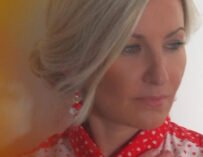
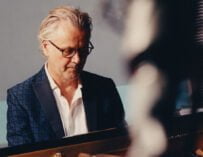
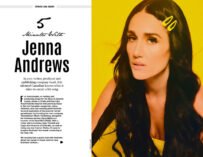
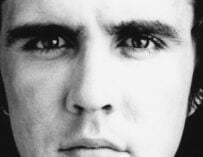



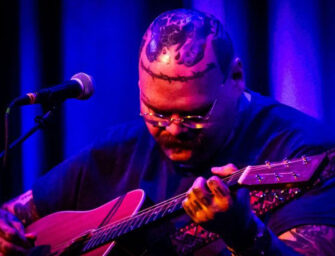
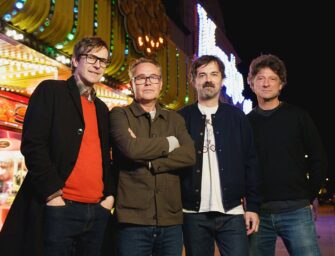





















Related Articles